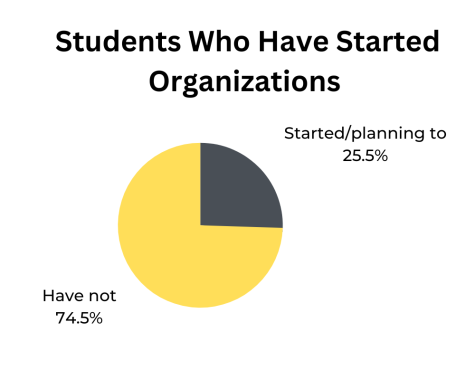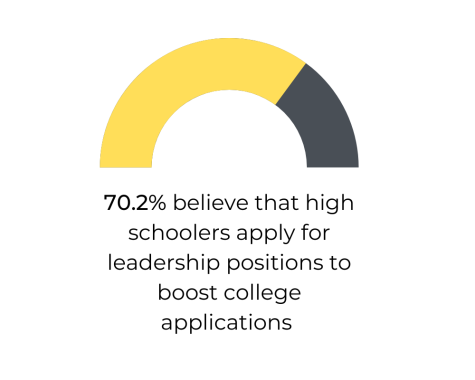Have Students Cracked the Inauthentic Formula To College Applications?
Nonprofits, startups, and organizations once held a sense of prestige in our society: they were designed to give back to communities and make tangible change. However, now they have simply become a box to check off on college applications. With top-tier universities’ acceptance rates plunging to drastically low figures and the college application process becoming a dog-eat-dog world, high school students lunge at any opportunity to launch an initiative — no matter the amount of passion they truly hold for the topic. But have they cracked this inauthentic formula to college applications?
Westwood Student Press conducted a survey to get to the root of the situation, the students themselves. The survey collected 47 responses and yielded varying perspectives on leadership positions and initiatives in high school.


- 74.5% of students at Westwood have not started an organization (company, non-profit, club), but 25.5% of students have started one or are in the process of forming one
- 76.9% of seniors surveyed believed that leadership involvement benefited them in the application process
- The top 3 reasons students believed high schoolers started nonprofits was for college applications (89.4%), passion and impact (53.2%), and providing tangible benefits to communities (46.8%)
- 70.2% of students believe that high schoolers apply for leadership positions to boost their college applications
20 years ago, the SAT was the pinnacle of college applications, yet now it has become an optional checkpoint to validate other parts of the application. Instead, there has been a greater focus on starting clubs and organizations. Student Council Executive President Justin Gao ’23 plays a lead role in the club approval process and has noticed an increase in applications just in the past year.
“We’ve had to review upwards of 20 clubs this year so definitely a lot more than last year and I think that’s definitely been a large change,” Gao said.
Among the club applications, Gao has observed a common theme of STEM being the focus of clubs. Students are making it their mission to increase awareness and inclusivity in the STEM world, but with almost identical goals and overlapping activities, it raises the question of whether there’s a true necessity for so many of these STEM-based organizations at one school. There’s such a heavy emphasis on starting a club that these clubs are beginning to blend in with one another and lose their intended impact.
Nonprofits are among the organizations that students are founding. With ample resources and money, people can register nonprofits with the click of a button. However, students have begun abusing this ease in starting nonprofits. A large majority of student-initiated nonprofits have similar missions, from helping underprivileged children to creating a cleaner planet. Nonprofit organizations have the sole purpose of advocating community engagement and creating tangible change, but high school students have mutated them into mainstream extracurriculars with lackluster passion.
“I think that most of the non-profits [and] clubs that are being started right now are just unnecessary,” Lasya Adivi ’23 said. “If students really cared about their community, there are so many non-profits that already exist that the student would join.”
Ultimately, it comes down to the ethics of it. Registering and managing a 501 (c)(3) organization, which refers to charitable organizations that are tax-exempt, requires a great deal of time, effort, and money when done right — but the problem is students aren’t doing them right. On top of insincere and inauthentic efforts to drive change, once students fill up their college application with their inflated impact on their community, the organization is abandoned shortly after. The purpose of nonprofits simply disintegrates when students serve themselves and not their communities.
“There are a lot of people that have gotten into college with fake or barely engaging clubs, and have completely exaggerated their impact on the community,” Adivi said. “Nowadays, it feels like a requirement to start a non-profit [or] club in order to fulfill the minimum to get into a good college.”
In the survey, students were asked if they would still start these initiatives if they could not add it to their list of extracurricular activities on college applications. The majority of the surveyees believed that students would not start organizations without the incentive of boosting their resumes.
“The sole drive for the people who are able to provide assistance to their community is to get into a highbrow college,” senior Jonah Malinger said. Malinger is the co-founder of Teens Who Care, a nonprofit centered around donating school supplies to underfunded schools. “This is teaching them that kindness is something you should do only because there is a tangible reward that comes along with it.”
High schoolers go to extreme lengths to write “founder” on their college applications, yet once they claim the title, what remains is a myriad of inauthentic and exaggerated organizations that have little impact. It’s not only extremely unethical but also an ineffective way to stand out to admissions officers anymore. There needs to be a change in this so-called formula students have figured out to get into top universities.

Class of 2025
Feeding my ardent love for journalism, I am beyond excited to serve as the Horizon Editor-in-Chief to not only give a voice to the...





